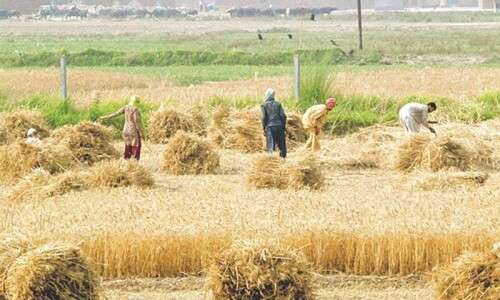Introduction
ISLAMABAD: Finance Minister Muhammad Aurangzeb has voiced his dissatisfaction with the delayed implementation of new agricultural income tax laws by three provinces. This legislation is a crucial part of the conditions agreed upon with the International Monetary Fund (IMF) under the 37-month $7 billion Extended Fund Facility.
National Tax Council Meeting Overview
Finance Minister’s Displeasure
The finance minister reviewed various tax initiatives during the National Tax Council (NTC) meeting, held after an 18-month hiatus. During this meeting, he directed the finance ministry to convene NTC meetings every three months to monitor the progress of different tax policies.
Provincial Delays
An official source revealed that the finance minister was particularly dissatisfied with the sluggish pace of passing agricultural income tax laws by Sindh, Khyber Pakhtunkhwa, and Balochistan. Although the KP government has approved the bill, it has yet to be presented to the assembly. No updates were provided on whether the Sindh or Balochistan cabinets had passed their respective bills. Given the slow progress, the finance minister plans to discuss the matter with Sindh Chief Minister Murad Ali Shah. Punjab remains the only province that has successfully enacted the bill through its provincial assembly.
FBR’s Reluctance
The Federal Board of Revenue (FBR) has only agreed to disclose information about taxpayers who have reported agricultural incomes in their tax returns. The FBR is hesitant to share additional information with the provinces due to current legislation that protects taxpayer confidentiality.
Collaborative Efforts for Tax Reforms
National Fiscal Pact
An official announcement after the meeting highlighted that the NTC gathered key federal and provincial stakeholders to address critical tax reform and harmonization issues. The meeting was framed within the context of the recently signed National Fiscal Pact, emphasizing the need to harness the full tax potential from under-taxed sectors like real estate, property, and agricultural income.
Key Discussions
The agenda focused on fostering collaboration between federal and provincial authorities to enhance tax systems, improve compliance, and boost revenue collection. Discussions centered around strengthening information-sharing mechanisms between the FBR and provincial revenue authorities, leveraging advanced tools for data analysis, and implementing digital solutions to streamline tax collection.
GST Harmonization
There was a consensus to advance efforts to harmonize the General Sales Tax (GST) across provinces and transition to a unified tax portal for better efficiency and transparency. The meeting also focused on establishing a single portal, harmonizing tax rates, and agreeing on a list of taxable services.
Housing Finance Initiatives
Avoiding Directed Lending
The finance minister stated that the government would not revert to directed lending for the housing sector. Instead, he emphasized creating incentives to facilitate bank-led financing, making housing finance more accessible to the public.
Minister’s Statement
Speaking at the International Affordable, Green, and Resilient Housing Conference, the minister said, “We will not go back to directed lending, which was the wrong thing to do. It creates distortions and has medium-term implications.” Instead, the government will focus on incentivizing banks and microfinance institutions to lead in providing housing finance.
Addressing Housing Sector Challenges
The minister highlighted the housing sector’s linkage to population growth and climate change, with the country’s population growing at an alarming rate of 2.5%. He noted the far-reaching consequences, including child stunting, poverty, poor learning outcomes, and a significant number of girls being out of school.
Reconstitution of SOEs’ Boards
Cabinet Committee Decisions
The Cabinet Committee on State-Owned Enterprises (CCoSOEs), chaired by Mr. Aurangzeb, approved various summaries, including the reconstitution of the board of directors for the Printing Corporation of Pakistan (PCP), Pakistan Railways (PR), and Overseas Pakistanis Foundation (OPF).
Conclusion
The finance minister’s dissatisfaction with the slow pace of passing agricultural income tax laws reflects the challenges in implementing crucial tax reforms. The collaborative efforts discussed during the NTC meeting aim to enhance tax systems and improve revenue collection. Meanwhile, the government’s focus on incentivizing housing finance rather than directed lending marks a strategic shift to address the housing sector’s challenges.
FAQs
1. Why is the new agricultural income tax legislation important?
The new agricultural income tax legislation is vital as it forms part of the conditions agreed upon with the IMF under the $7 billion Extended Fund Facility, aimed at enhancing tax revenues from under-taxed sectors.
2. Which provinces have delayed the implementation of the agricultural income tax laws?
Sindh, Khyber Pakhtunkhwa, and Balochistan have delayed the implementation of the new agricultural income tax laws, whereas Punjab has successfully enacted the bill.
3. What is the role of the Federal Board of Revenue (FBR) in the new tax legislation?
The FBR has agreed to disclose information about taxpayers reporting agricultural incomes in their tax returns but is reluctant to share additional information with provinces due to confidentiality legislation.
4. What are the key focus areas discussed during the National Tax Council meeting?
The NTC meeting focused on fostering collaboration between federal and provincial authorities, enhancing tax systems, improving compliance, boosting revenue collection, and advancing efforts to harmonize the General Sales Tax (GST) across provinces.
5. How does the government plan to promote housing finance?
The government plans to promote housing finance by creating incentives for banks and microfinance institutions to lead in providing housing finance, rather than reverting to directed lending.
MUST READ:
https://flarenews.pk/2024/12/05/shaheen-police-targeting-pti-via-mobile-checks/



